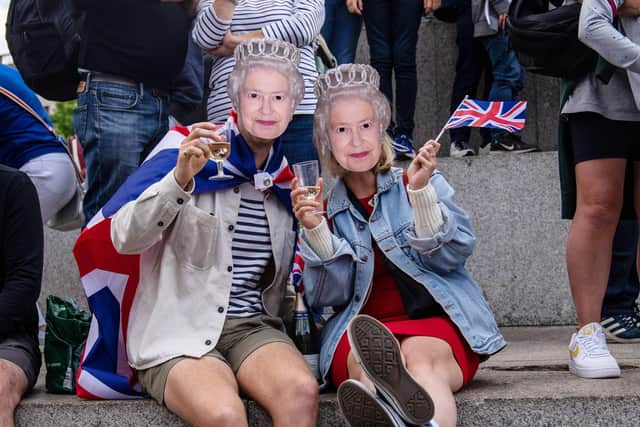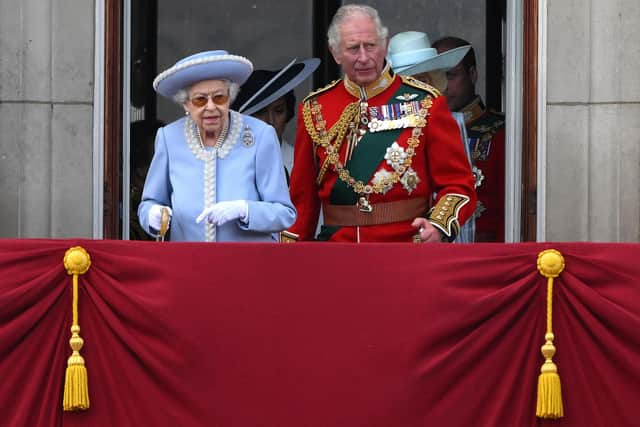Queen Elizabeth's Platinum Jubilee: BBC's royalist rhetoric rings false for millions – Joyce McMillan
The diversity of the 21st century UK – Scots, Welsh, Northern Irish, Scouse, Afro-Caribbean – is much in evidence in the wider coverage, suggesting that the BBC has definitely got the idea about the kind of image 21st century ‘Global Britain’ wants to project to the world; and on this beautiful June day, it is belting it out for all it’s worth, along with dazzling pictures of military pageantry, and of central London at its ceremonial best.
All of which is enough to provoke some deep thought about the British monarchy and its meanings, as they have played out over the last 70 years. The Queen came to the throne just six months before I was born; and a few years later, our house was graced with a copy of Arthur Mee’s Children’s Encyclopaedia, a remarkable publication in 20 handsome red-bound volumes, which became our wikipedia, a fount of knowledge on everything from history to astronomy.
Advertisement
Hide AdAdvertisement
Hide AdThe final volume contained a full-colour section on the 1953 coronation, which it seemed to regard, Francis Fukuyama-style, as some kind of end of history; and when I was six or seven, I would gaze in fascination at those pages, at the pageantry and high political theatre of it all, and the beautiful, slender young Queen, centre stage.
My Labour-voting parents worried about me; is she, they asked, turning into a royalist? In those days, though, it really didn’t matter. The UK was signed up, however imperfectly, to a progressive political project, creating a cradle-to-grave welfare state, and transforming its old Empire into what was supposed to be a Commonwealth of equals; and the Queen – like her father before her – seemed happy to preside over that endeavour, in a spirit of national unity and harmony.
What is true, though, is that a monarchy – of which there are still many, in this corner of Europe – can only finally look as good as the nation it seeks to embody; and it’s perhaps because of that harsh reality that attitudes to the monarchy in Britain have tended both to harden and to polarise in recent decades.
The Queen is, and always has been, both a symbolic figure – one who takes seriously the priestly duty of service placed upon her at her coronation – and a real woman living in the real world; and as a woman of immense wealth in today’s divided world, with her wider family thoroughly networked into the grotesquely wealthy global financial elite that has emerged in recent decades, she has been unable entirely to avoid the attendant moral hazards.


In truth, profoundly unequal times are never good for an institution that is supposed to represent a united nation; and just as a previous Prince of Wales’s compulsive partying with international millionaires during the Great Depression of the 1930s finally led to the Abdication crisis, so Prince Andrew’s foolish and allegedly criminal association with plutocrats Jeffrey Epstein and Ghislaine Maxwell has forced the Queen, in her Jubilee year, to buy her second son out of trouble in the most questionable manner.
Nor are these merely personal matters. They epitomise a world out of joint, in which monarchy and its wealth, when the chips are down, seems implacably associated with increasingly indefensible elites, against the forces of social justice and decency; and this in a country wounded by a cruel 15 years of austerity, where almost five million people are currently facing severe poverty and food insecurity.
In that situation, it is hardly surprising that the royalist rhetoric of the BBC and other establishment media, and the sense it conveys of a Britain where all is for the best in the best of all possible countries, increasingly rings false for millions. When the Queen came to the throne, she inherited a nation at least in some degree of harmony with the values of service, and devotion to the public good, to which she dedicated herself at her coronation.
Over the last 40 years, though, and particularly since the crash of 2008, the conduct of British government has often made a mockery of those values, abusing and impoverishing the ordinary citizens of this country in order further to enrich an increasingly worthless and ecocidal global elite, and culminating in the disgusting spectacle of a Prime Minister countenancing drunken lockdown parties in Downing Street, while the Queen mourned her husband alone.
Advertisement
Hide AdAdvertisement
Hide Ad

As a monarch, a rich woman, and a very old lady of 96, the Queen cannot challenge the out-of-control form of capitalism that has brought us to this pass; nor, I suppose, would she want to.
Yet nonetheless, it is a system that has damaged her people, divided her country, and increasingly made it impossible for her to deliver the kind of benign and relatively non-controversial monarchy bequeathed to her in 1952. This is not, in other words, the happiest of closing acts to such a long and dutiful reign; nor the most promising of legacies to pass on to the Queen’s eldest son and grandson.
Yet still, I hope that the Queen, in her great old age, was able to enjoy the sunshine and pageantry of her Jubilee day, and to feel that for her, unlike many others with whom she has had to deal down the years, her reign has been the story of a job well done – or at least done as well as circumstances allow – to the very last.
Comments
Want to join the conversation? Please or to comment on this article.

